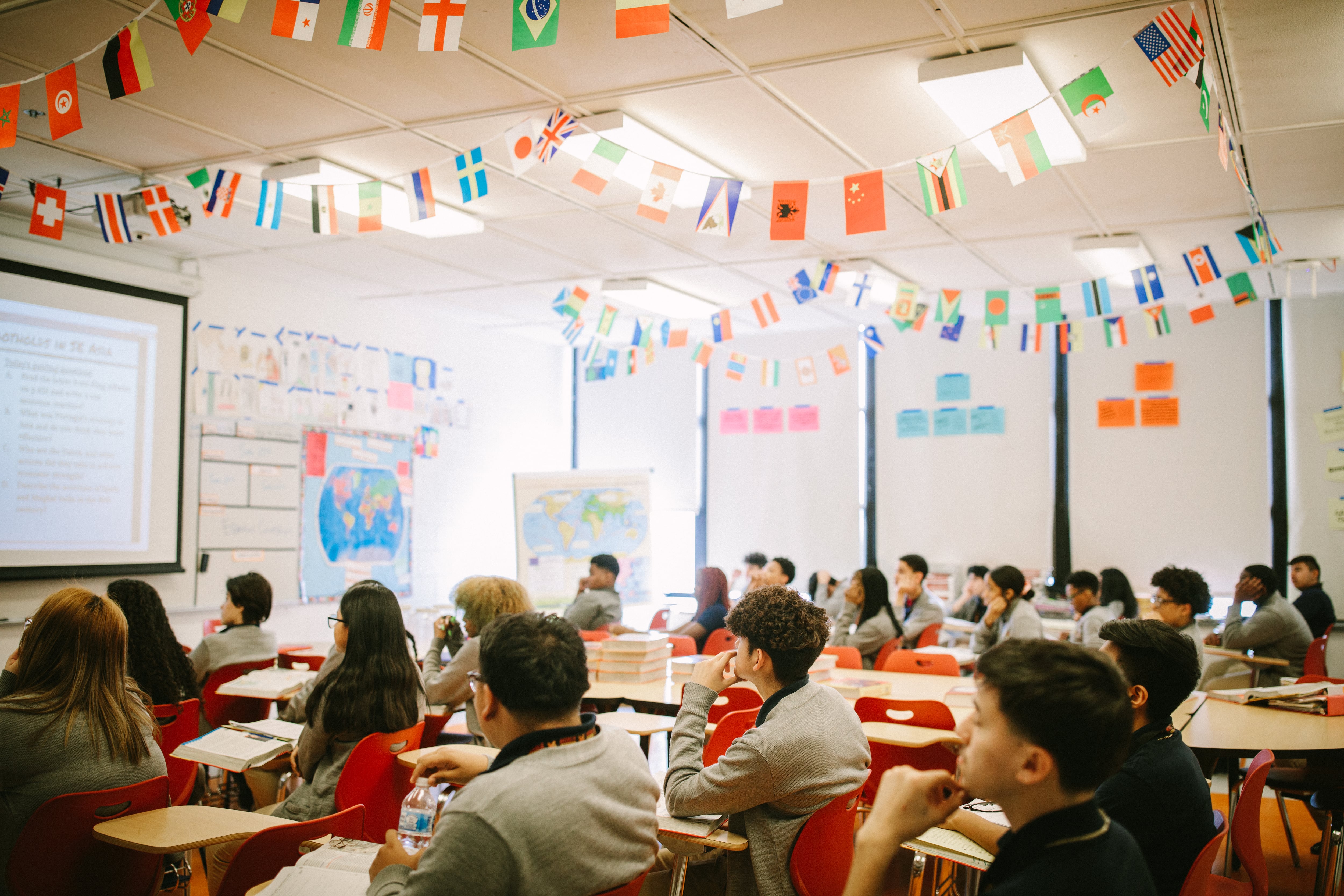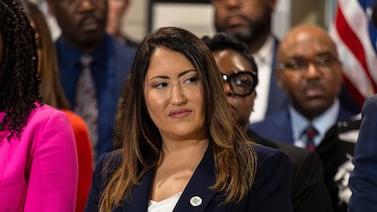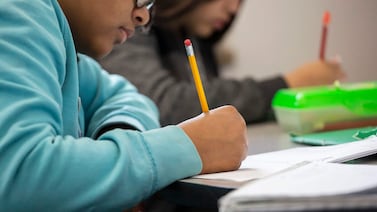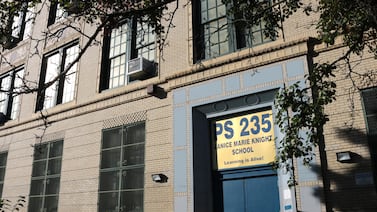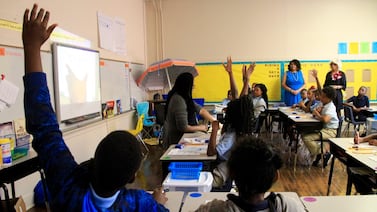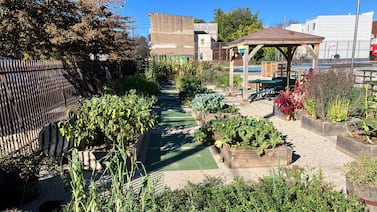At Noble Charter Network, the school year usually starts with a pep rally. This year, students tuned in to a video — preceded by a trigger warning — showing a series of news stories about the police killings, protests, and pandemic that have made 2020 a year like no other.
Afterward, in a virtual town hall, Noble’s leaders apologized for past actions they said hurt Black students, from punitive discipline policies to steering students away from historically Black colleges and universities.
And they made a promise: Noble, Chicago’s largest network of charter schools, would become antiracist.
“We have taken racist actions that have created racist outcomes, and we can no longer operate under the illusion that everything is well,” D. Nigel Green, the network’s director of equity, inclusion and diversity, said.
For two decades, Noble has promised Black and Latino families a rigorous academic environment for students, part of the “no excuses” charter model that called for strict discipline and high academic expectations. Even as some policies and educational approaches have changed over the years, one constant remained: Network leaders believed Noble was the solution to an educational system that too often failed its students.
This year, amid the twin upheavals of the pandemic and a national protest movement against police violence, Noble has accelerated its efforts to better serve the Black and brown students they teach by reconsidering school policies and procedures that might have contributed to positive academic outcomes but were punishing to students.
Several well-known charter school networks have taken similar steps in recent years to move away from what had come to define “no-excuses” charters. KIPP, the country’s largest nonprofit charter school network, decided to get rid of its slogan, “Work Hard. Be Nice.” because its leaders thought it reflected an effort to “control Black and brown bodies in order to better condition them to be compliant.” Uncommon, a Northeast-based network, has promised to revamp its curriculum and start a parent advisory group.
Noble, which before had promised to “sweat the small stuff” on discipline, got rid of its school uniforms and a controversial demerit policy that punished students for small infractions such as chewing gum or not wearing a belt, and leaders started a mastery-based grading system. And in a pandemic that has disproportionately affected Black and brown families, Noble created a flexible, almost entirely asynchronous learning experience for its 12,755 middle and high school students.
What Noble kept are still some of the original tenets of the “no excuses” movement: A data-centered approach to student learning and a focus on attending college.
The network’s leadership says its intentions are serious, but that real change takes time.
“The intentions of Noble have always been rooted in good … of Noble as an interrupter of racism. But the reality is that when we listen to our alumnus and current students, it’s clear we have been simultaneously both an interruptor and a perpetrator,” said head of schools Ellen Metz.
A new promise
When Angelica Alfaro started at Noble in the fall of 1999 as a member of its founding freshman class, she felt inexplicably lucky. Alfaro, the daughter of Mexican immigrants in Humboldt Park, hadn’t been accepted into any of the selective-enrollment public schools. Her neighborhood school felt intimidating and heavily policed.
Noble offered a free education focused on college prep. The uniform and discipline rules felt restrictive, but Alfaro saw them as a minor tradeoff.
“I am really grateful for the fact that I was in Noble that year,” said Alfaro, who would go on to spend her career within the network as a lobbyist and the director of alumni affairs. “Every single adult in the building believed in me.”
In the two decades since it opened, Noble has expanded to 17 campuses and won a legion of loyal families that send generations of siblings and cousins to its schools. The network has been lauded for its efforts to support undocumented and low-income students and the number of its students that attend college. Still, the district’s own data for the class of 2018 paints a complicated picture: on average, Noble had a higher college enrollment rate, with 85% of its students pledging to enter college in the fall, compared to 72% from Chicago Public Schools. But the percentage of those students who were still enrolled a year later was about the same, with around 3 out of 4 remaining in college their second year.
There have also been rumblings of discord both from inside and outside the organization. As the network sought to expand, critics accused it of pulling motivated students out of neighborhood schools, while also pushing Noble students with high needs back to those district schools.
Teachers and students from within the network also became increasingly critical. Teachers, many recruited from elite colleges, complained of punishing work schedules and middling pay. They tried several times to form a union. Students led years of protests over discipline and dress standards, in particular a policy that only allowed students to use the bathroom with a hallway escort.
Over the last few years, the tide against the “no excuses” discipline approach began to turn as educators began questioning whether their harsh discipline was contributing to the “school to prison pipeline,” and if those tactics were necessary to achieve academic success — or whether students actually needed more social-emotional and trauma-informed learning.
Nationally, new charters that have opened their doors in the last decade were less likely to call themselves “no excuses” charters: About 22% of newly approved charters used the term in the 2013-14 school year, but by the 2017-18 school year that number had fallen to just 7%.
Metz, who began her career at Noble as a teacher and was a principal of Noble Street College Prep, said being a progressive leader at Noble in the mid-2010s meant strictly adhering to the student code of conduct without adding any extra rules. “This is where a lot of my shame lives,” she said, because she was proud to say she “didn’t care if a student’s top button of their polo was buttoned,” even as she followed other rules to the letter.
That began to shift in November 2018, when the network announced its head and founder Michael Milkie would leave the organization following allegations of improper conduct with alumni. Jones, a Black woman, took over as CEO, and in 2019, revamped Noble’s dress code policy in a widely celebrated move. “I was really excited to eliminate those restrictions and stand in solidarity with those students and teachers,” Jones told Chalkbeat at the time.
One year later, when the pandemic forced Noble to build a remote learning program from scratch, school leadership said they were already considering how to become more responsive to students’ needs.
“More than ever, our students need our support, and for their identities to be affirmed,” said Jones, speaking at one of the network’s back-to-school panels.
Still, she was wary of what the work-in-progress could look like: just talk.
An unexpected opening for change
On a Tuesday afternoon in the fall, Jonathan Green’s Algebra II students, most with their videos off, were zipping through imaginary numbers.
“I want somebody to come off mute and tell me what this is. We’re ruling square root, right? You can hear it in the name, right?” asked Green, his voice energetic. “What if I asked you, what does x squared equals negative nine? What does x equal?”
Silence. Green sketched the next step of the formula out on his iPad, and then — “It’s three,” said a student whose Zoom photo shows him wearing sunglasses and a mask. As the class went on, students answered haltingly, but several who stayed behind for office hours jumped in with questions.
This time last year, students might have been docked points for not participating in a lesson or not having finished their homework.
But this fall, classrooms like Green’s are where Noble’s promised shifts can be seen in real time.
The network’s students, about half of whom are Black and half Latino, used to have one of the longest school days in the city, at around seven and a half hours, a point of pride for Noble. Now, in an effort to offer more flexibility, they learn mostly on their own through recorded videos and online worksheets, and can attend Zoom classes or teacher office hours to work through any questions.
That’s coupled with a later morning start and a grading system that judges students on what they’ve learned, not classroom behavior or when they turn in their assignments. (Noble has said it will continue virtual learning through at least April, while Chicago Public Schools has recently set a return date for the start of 2021 for pre-kindergarten through eighth grade.)
To create a positive classroom culture, the network’s remote learning plan explicitly instructed educators to regularly use positive reinforcement and made it optional for students to turn on their videos.
Those changes are in contrast to Chicago Public Schools’ approach, where teachers have been told to stick to pre-pandemic grading and teach live sessions in blocks of time that some families have said require too much screen time for students.
It’s also different from the Noble classroom experience as recently as last year, when the demerit system was still a central part of the network’s discipline. (Teachers were given some flexibility in how to enforce them.)
The coronavirus pandemic then brought a harsh wake-up call.
Like most schools, Noble struggled to build an impromptu learning plan quickly after the governor closed schools in mid-March. “We never wanted to be as unprepared as we were in March,” Metz said.
“We saw many of our students turning to work, or living in multi-generational homes where students are sharing internet and devices,” she said. “Students need flexibility the same way adults need flexibility.”
This summer, the network created focus groups of parents, teachers, and students to help them develop their plan for the new school year. As of this fall, they’ve also given out 13,000 Chromebooks and 4,000 hotspots to create their virtual school.
So far, educators in the network say they appreciate the changes, even as they worry that students are being thrust into a level of independent work for which they hadn’t been adequately prepared.
When Angela McByrd decided to start teaching at Noble, she was attracted not by what the network was, but what it could become.
McByrd, who runs a website under the moniker “the woke STEM teacher,” was looking for a workplace that was responsive to students’ identities, and, unlike the previous charter where she taught, didn’t rely primarily on the threat of disciplinary infractions to keep students learning. Even knowing what critics said about Noble, she appreciated that teachers were able to choose how demerits were used.
“My classroom is a safe place for students — you are not going to get demerits if you accidentally call out during class,” McByrd said.
She’s in favor of the recent changes, but worries that without preparing students for them, particularly the level of independent learning the new approach demands, they are setting them up for failure. “They are just being thrust into this, and some of them haven’t built that level of autonomy yet, and that is difficult,” she said.
McByrd said she started the year worried about how she would connect with her students remotely. To build community, she made a rap video introducing herself, and then started each lesson with a math quiz rooted in real-world scenarios. That means her students show up regularly to her optional lessons, which helps those students who are not strong independent learners.
Other teachers, particularly those who work with special education students, say they are struggling to maintain engagement.
Noble officials also point to network-wide shifts that show a change in their approach.
For the first time this year, Noble hired a chief equity officer and a director of diversity, equity and inclusion, both of whom climbed the ranks in Noble through campus leadership positions. The network also runs a Diverse Leaders Fellowship, and has increased its efforts to recruit teachers of color by drawing from former Noble students.
Changing the culture, however, means putting a lot of the work on individual teachers.
“The hard work, the real work is in that introspection, that personal action, and that personal accountability,” Jones, the CEO, told teachers this fall.
At a teacher professional development event in October, Jones pointed to a student survey, efforts to learn the culture of students the schools served, and promised network-wide Diversity, Equity and Inclusion trainings as a start.
Teachers say they have seen some of these efforts at their schools, from Diversity, Equity and Inclusion committees formed this year (though McByrd said she wished more white educators would take part in these groups) to a series of anti-racism training sessions.
But the size of the network, with 17 campuses, means that culture changes at some campuses may not be felt across the board.
A teacher at the Pritzker campus, who asked to remain anonymous because he was critical of the efforts, said there were few conversations about DEI initiatives or broad-based changes at his school.
For McByrd, a campus-wide initiative, rather than a short-term shift in giving fewer demerits, would be the best way to ensure change.
“When Noble made the switch to allow students to use the bathroom, color their hair, wear tattoos, that was such a huge deal, and it happened all at one time across all campuses,” she said. “We as a network need to continue in that same direction of change.”
National experts who have followed the national trends away from “no excuses” charter models, like Christopher Torres, a professor at Michigan State University, say classroom-level changes can only go so far without a broader shift in how networks understand and address issues of social justice and racial equity.
In particular, Torres notes, a teacher-centered approach in the classroom relies on constant student attention kept in check through strict discipline. A more student-centered approach would “require radically changing common behavioral expectations,” said Torres — a shift that may be taking place under Noble’s remote learning approach but is also hard to judge in a remote setting.
David Stovall, a professor of education at the University of Illinois at Chicago, said it’s too early to see whether Noble’s promised changes will stick, but he said the changes indicated a hopeful shift. “It’s important to take into account that the recognition of the racist nature of the U.S. schooling system and the practices they have engaged in — it’s almost unheard of in terms of a school system indicting themselves in that.”
He stressed, however, that changing Noble’s internal practices still wouldn’t change the network’s broader effect on education in Chicago, which critics, including Stovall, say has had the cumulative effect of removing students who may otherwise have been educated in district-run schools.
Looking ahead
Families who send their children to Noble have mixed feelings about the changes so far.
David Turner, who has one freshman and one junior at Noble Street College Prep, said he chose Noble because of the strong focus on academics. He’s had a hands-on role with his two sons, encouraging them to keep their cameras on and making sure they are participating.
Turner, who is Black, said he’s glad to see the network’s response to the broader social justice movement happening around the country. But the real test, he said, isn’t just about ending harmful practices. It’s finding more resources for students at Noble and beyond — the ones that schools in wealthier communities have.
“I want to make sure that Black and brown neighborhoods can access not just the same subjects,” he said, “but how they’re being taught and the resources around them. We need to make it equal across the board.”
Sylvia Garcia, whose child attends Noble’s UIC College Prep, has sent her children to charter schools since they were in kindergarten. “I’m a big supporter of parents having choice,” said Garcia, who lives near Midway Airport.
She was attracted to UIC because of its high academic standing, and sent her son there despite its reputation for harsh discipline. “I was happy to hear that, when he was going to start, the discipline had changed.”
Elisa Martinez, whose son attends UIC Noble, has struggled to motivate her son to work independently. “Every day, it’s a battle,” she said.
Martinez works as a gym teacher at a Catholic school in Pilsen, and her husband begins work at 4 a.m., which means her two children are alone for much of the school day.
Her son, Diego Martinez, acknowledged that he struggles with remote learning. “When I wake up, honestly, work isn’t the first thing I think about,” he said. What does pull him in is his relationship with his ROTC teacher. Still, between the pandemic and without the structure of the school day, he finds himself struggling to put aside video games and learn about math or civics through a screen. “I’m trying to figure out a motivation to push myself to do at least the minimum.”
Elisa Martinez didn’t choose Noble for its discipline practices, but she said she would favor some discipline if it pushed her son to participate in school. “They need that structure, these kids,” she said. “I think it’s needed.”
Whether the changes will stick is an open question, said Metz, the Noble head of schools. For the past few years, the network has invited focus groups of parents to weigh in on its student code of conduct, and leaders are likely to do something similar in the future, she said.
At the virtual event when the school year started, Noble leaders acknowledged large problems facing the network. Teachers asked how to address the Noble students graduating from high school who couldn’t write well, how to assist students who didn’t want to go to college, and noted that Black male students were leaving Noble at higher rates than other students.
Top leaders said they are in the first period of change: understanding the problem.
“We are in the thick of this work right now,” Metz said. “I need the public to give us a chance to do this work.”

